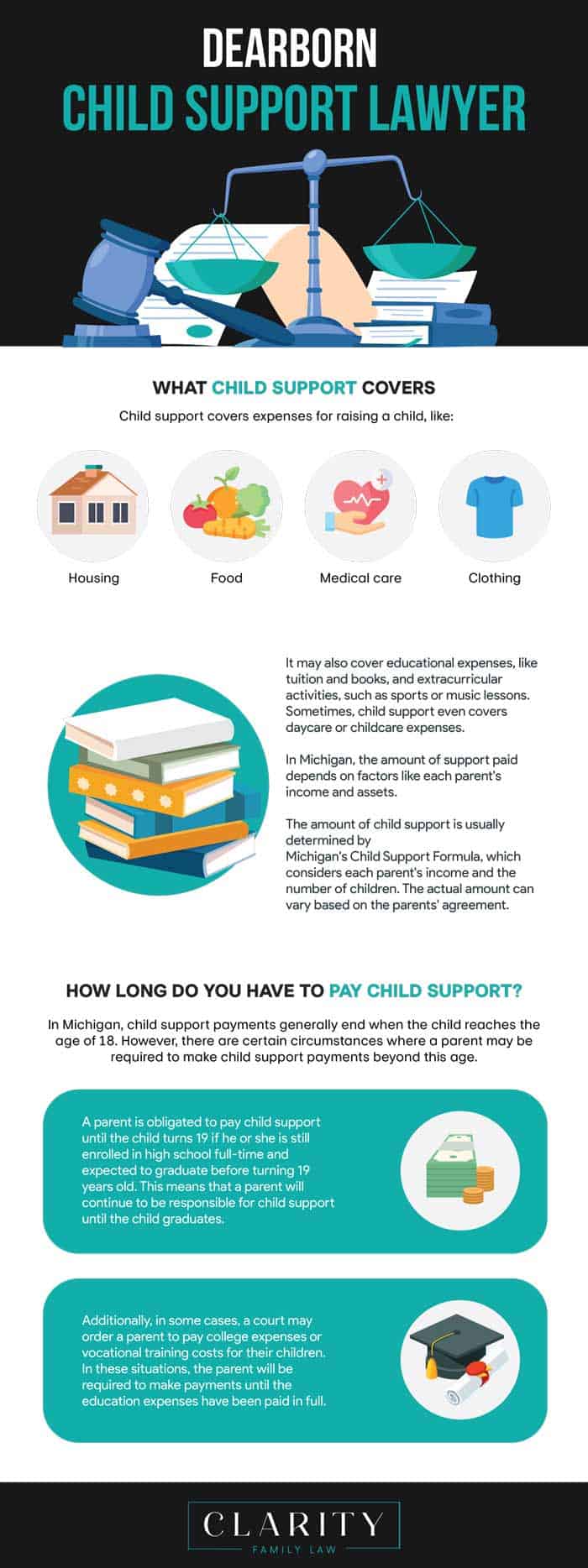Michigan law requires both parents to financially support their children until they turn 18 or graduate from high school. A Dearborn child support attorney can help determine the appropriate amount of support payments and assist with visitation rights and custody schedules.
They can also resolve disputes relating to child support modification and represent clients in court regarding these issues if needed. It's important to hire an experienced family law attorney familiar with local court rules and procedures.
Contact Clarity Law Firm at (313) 513-1919 to schedule a free consultation today.
How is Child Support Calculated in Dearborn?
There are guidelines used to determine child support in Michigan. The formula considers factors to ensure children receive appropriate financial support through monthly payments.
The court looks at each parent's gross income, personal property, unemployment benefits or wages, tips, and alimony. Income is adjusted for deductions like taxes and health insurance premiums.
The court also considers the number of children and any special needs they have, such as childcare costs and medical costs. Parenting time schedules are also taken into account.
What Child Support Covers
Child support covers expenses for raising a child, like housing, food, medical care, and clothing. In Michigan, the amount of support paid depends on factors like each parent's income and assets. Child support typically covers the child's essential expenses, including food, clothing, and medical care.

It may also cover educational expenses, like tuition and books, and extracurricular activities, such as sports or music lessons. Sometimes, child support even covers daycare or childcare expenses.
The amount of child support is usually determined by Michigan's Child Support Formula, which considers each parent's income and the number of children. The actual amount can vary based on the parents' agreement.
What Assets Are Considered When Calculating Child Support?
If you live in Michigan and are a non-custodial parent, you may have to pay child support. The amount you owe depends on your income. Michigan uses an official formula to determine child support. This formula considers both parents' incomes and the number of children. It aims to calculate a fair amount.
The amount of child support you pay is generally based on your income. Other factors, like assets and debts, may also be considered. The court considers the children's needs, tax deductions, and spousal support. Both parents have to disclose all income sources.
The court also considers the number of children, their needs, parenting time, childcare expenses, medical bills, health insurance premiums, and educational expenses. The court can deviate from the formula if necessary.
How Long Do Child Support Payments Last?
In Michigan, child support payments generally end when the child reaches the age of 18. However, there are certain circumstances where a parent may be required to make child support payments beyond this age.
A parent is obligated to pay child support until the child turns 19 if he or she is still enrolled in high school full-time and expected to graduate before turning 19 years old. This means that a parent will continue to be responsible for child support until the child graduates.

Additionally, in some cases, a court may order a parent to pay college expenses or vocational training costs for their children. In these situations, the parent will be required to make payments until the education expenses have been paid in full.
When a parent fails to make payments, the court can order wage garnishments or other enforcement measures. If the parent still doesn't pay, they may face penalties, including jail time. Michigan parents need to know their rights and obligations regarding child support.
How to Enforce Unpaid Child Support Payments
Child support is an important payment for a child's needs. In Dearborn, Michigan, there are tools available for enforcing court-ordered child support. The main tool is the automatic withholding of wages, where employers deduct money from a person's paycheck and forward it for distribution. This is used in over 80% of child support cases in Michigan.
The court can also deny or suspend a person's driver's or professional license for non-payment. They can garnish bank accounts and place liens on real estate. In some cases, criminal charges can be filed against a noncustodial parent who doesn't pay child support.
Options in the Event of Non-payment of Child Support
Consulting with a Michigan child support lawyer can help you take appropriate action to secure the payments owed to you and your child.
First, talk to a family law attorney about filing a motion for contempt in family court. This motion asks the judge to order the other parent to comply with the court-ordered child support agreement. If the judge finds that the other parent willfully refuses to pay what they owe, sanctions and penalties may be imposed.

Additionally, you can use wage withholding to take money out of the non-custodial parent's paycheck. This is an effective way to ensure that child support payments are made on time and in full.
If a parent falls behind on payments, you can also take legal action to garnish their bank accounts and other assets.
One final option is to file criminal charges against the non-custodial parent if they have failed to make court-ordered child support payments.
No matter what steps you decide to take, it is important to consult with an experienced family law attorney for assistance.
Collecting Past Due Child Support
If a parent has failed to make child support payments on time, it can be difficult to get the money that is owed. Fortunately, there are legal options available to help parents who are owed past-due child support.
A Michigan child support lawyer can help guide a parent through the process of collecting past due payments and ensuring that their family’s financial needs are met.
In some cases, a court may order the non-paying parent to pay interest on overdue child support payments. Additionally, if the other parent is found in contempt of court, the judge may order them to pay for the legal fees associated with collecting past due payments.
If the non-custodial parent fails to comply with a court order for past due child support payments, they may face serious sanctions, including jail time. In this situation, it is important to consult with an experienced child support lawyer who can help ensure that the other parent is held accountable for their obligations.
Modifying Child Support
When parents separate, the court usually orders one of them to pay child support to the other. Child support helps make sure that your children have their basic needs met. But it can be hard for a parent to keep up with payments if they experience a major change in circumstances. This could include losing a job, having extra medical expenses, or switching from part-time to full-time work.

If a parent experiences a significant change in circumstances, they may be able to modify their child support order. A modification can help ensure that the amount of child support is fair and reasonable for both parents. To do this, the parent must file a motion with the court to request a modification.
Then, both parties will need to provide evidence of their changed financial situation or other relevant circumstances. The court will then make a decision based on the evidence presented.
Call a Skilled Child Support Attorney at Clarity Law Firm Today!
Are you looking for help to resolve a child support dispute in Michigan? At Clarity Law Firm, we understand how challenging it can be to navigate these complex family law issues and are here to provide the guidance and legal representation you need.
Our experienced Michigan child support lawyers have been serving clients throughout the state for many years. We will provide knowledgeable advice on parental rights and skilled representation tailored to your individual needs.
Contact us today at (313) 513-1919 to schedule a consultation and learn more about how we can help you.
